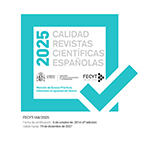El cambio de élites en Venezuela durante la primera etapa de la Revolución Bolivariana
Resumen
El cambio político que se produjo en Venezuela al calor de la Revolución Bolivariana trajo consigo una modificación en la correlación de fuerzas y en la forma en la que se configuraban las élites del país, surgiendo nuevos grupos de poder que alteraron la estructura del estado, entrando en conflicto directo con las corporaciones hegemónicas del periodo político anterior. Por medio de la Asamblea Constituyente y de la mano de toda una operación institucional, el chavismo consiguió debilitar a los partidos políticos del bipartidismo elitista para posteriormente impulsar el crecimiento de empresas y corporaciones que presentaran una línea de acción acorde al proyecto bolivariano. Desde una retórica populista de carácter antagónico, Chávez fue capaz de construir un sujeto pueblo que se contraponía al proyecto de las élites, asumiendo así los riesgos propios de este tipo de discurso; la extrema polarización social y la tendencia hacia el hiperliderazgo personalista. El trabajo pretende realizar una revisión de las estructuras tradicionales de la democracia previa al chavismo, y de qué manera se pretendieron articulan unas nuevas élites y movimientos sociales que tuvieron como objetivo construir una democracia protagónica que tomara distancia de las clásicas estructuras liberales.
Descargas
Descarga artículo
Licencia
La revista Política y Sociedad, para fomentar el intercambio global del conocimiento, facilita el acceso sin restricciones a sus contenidos desde el momento de su publicación en la presente edición electrónica, y por eso es una revista de acceso abierto. Los originales publicados en esta revista son propiedad de la Universidad Complutense de Madrid y es obligatorio citar su procedencia en cualquier reproducción total o parcial. Todos los contenidos se distribuyen bajo una licencia de uso y distribución Creative Commons Reconocimiento 4.0 (CC BY 4.0). Esta circunstancia ha de hacerse constar expresamente de esta forma cuando sea necesario. Puede consultar la versión informativa y el texto legal de la licencia.











